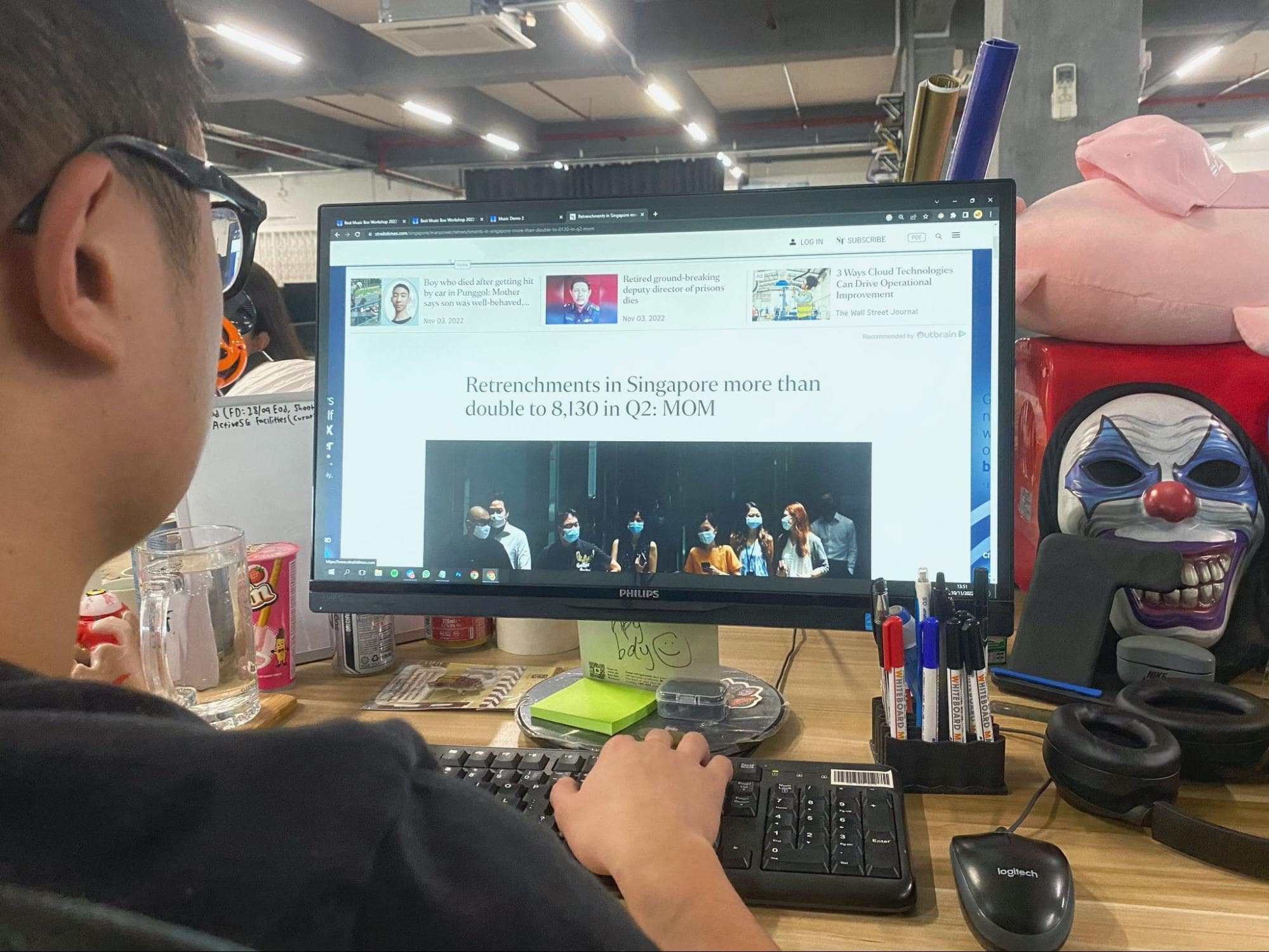Being retrenched in Singapore
There’s no easy way to put it – the economy isn’t doing very well. Sure, Mother Taylor and her 6 nights of The Eras Tour may have boosted it by $500 million, but there’s still news of retrenchments daily.
As someone who’s gone through it twice – retrenchments, not The Eras Tour – I only know the pain of being let go all too well. That doesn’t mean I think I’m done for, for the rest of my career. Retrenchments are still a very likely possibility. Here’s why I won’t be surprised I’ll go through another in the future:
Baby’s first retrenchment at 25
I’d been with a multinational company (MNC) for a little more than 2 years when the Singapore branch received an email calling for an emergency town hall. The company had been aggressively expanding into other markets in Asia, and monthly town halls had become the norm. Emergency or not, this town hall didn’t seem out of the ordinary.

Image credit: Dall-E
That is, until head honchos addressed the 200-strong crowd about “organisational restructuring”. It’s the first time I’d heard the term, and I naively thought it was just about a change in titles and who we’d be reporting to in the future. Needless to say, it came as a shock when HR summoned my team into the conference room to tell us that we’d been cut from the company altogether.
I mean, this was my first job out of university and I’d just turned 25. I’d heard about retrenchments but I thought that only happened to workers in their 40s or 50s, not fresh grads at the bottom of the food chain.
The retrenchment came with a moderate severance package but that didn’t stop me from going through all 5 stages of grief. Cue the tears, anger, confusion, and denial. I was sad I wasn’t working in the company I’d grown to love any longer, mad at higher ups that didn’t know how to strategise their expansions, and overall just bummed that I had to experience something as traumatic as this.
My second retrenchment at 30
Thankfully, I managed to bounce back relatively fast after being retrenched. 3 months after I was made redundant, I moved on to a second company where I could resume climbing the corporate ladder. It was a supportive place that even allowed me to take a year off to do a master’s degree programme.
But then Covid-19 hit. My work dealt primarily with travel and private aviation – 2 industries severely affected by a pandemic that was forcing people indoors. So when the whole country went into lockdown, I knew I had mere days before my time was up.
Sure enough, the week after circuit breaker ended, I was summoned yet again into a conference room with HR and my reporting manager. “I think you know what’s coming,” was all my manager could say to me.
“Yeah, I know.”

Image credit: Dall-E
30 minutes later, I had my table packed up in a box and yet another severance cheque in my hands. For the second time, and at the age of 30, I had been made redundant.
The experience was less dramatic than the first. There were still tears, anger, confusion, and denial. But I reached the last stage of grief – acceptance – a lot quicker than I did the first time round. Having been through redundancy once, I knew I could go through the process again.
Lessons I learnt from being retrenched
You don’t get retrenched twice in 5 years without learning a few lessons.
1. No job is ever safe
It’s ironic that in every town hall I’ve attended in every company that I’ve worked for, I would always hear how each employee is integral to the success of the company. Technically, we are, until the highest in power decides it’s better to cut their losses – i.e., you – to save the company.
In my first retrenchment, I was only a junior executive. I’d been promoted once but still very much on the bottom rung of the corporate ladder. The work I did was considered menial since I wasn’t involved in any decision-making processes or even leading a team. It made sense why an MNC would want to get rid of me and keep key players for business development.
But in my second retrenchment, I was now positioned much higher on the corporate ladder. I was Deputy Editor, only second in line to the Editor-in-Chief (EIC), and third overall to the Publisher. I sat at the round table with fellow heads of departments and was heavily involved in strategic planning. Surely, I would mean enough to the team that they could keep me somewhere? But you already know how that played out.
So, no, it didn’t matter how essential I’d been made to believe. When push comes to shove, your ass will be out the door.
2. Don’t burn bridges with the ones who did this to you
It’s natural to feel anger – rage, even – after being laid off. That’s what I mostly felt the first time it happened. I said every curse word I could at the people tasked with breaking this news to me. Then I went back home and continued lashing out at them in my Glassdoor review. My mentality was that if they didn’t want me, then I didn’t want anything to do with them.

Image credit: Dall-E
Big mistake. Many places I applied to after that asked for references. The only people I could tap into were those who’d been retrenched together with me. And even then, not many held high enough positions to be listed as a compelling testament of my work. I learnt my lesson the second time round and held my tongue instead, then bagged myself character references from a handful of higher ups.
3. Get in touch with external stakeholders you worked with
Chances are, you worked with people outside of your team, like clients and vendors. If you had a good working relationship with them, now’s the time to contact them and explain what’s happened to you.
First off, they’re already likely to be working in a similar industry as you, so they might know of job opportunities on their end. And even if they don’t, you can use them as referrals too. That’s what happened when I sent out emails of my departure to the team of freelancers I worked with before my second retrenchment. Many reached out to offer advice and even wrote recommendation letters for me.
4. Multiple retrenchments isn’t going to look bad on your resume
After being retrenched a second time, I thought maybe I was a jinx. It was a legit anxiety of mine that potential recruiters would think the same and therefore not hire me – just in case it actually turned out to be true.
But in all honesty, no recruiter I’d spoken to during interviews was fazed by my multiple retrenchments. With unexpected economic downturns and global pandemics, retrenchments are almost expected now. Having 1 or even 2 listed in your resume is fine.
I found that being upfront and open about it helped. It explained gaps in my resume and overall helped to gain sympathy from the recruiter.
Why I think I’ll be retrenched again
Even with 2 retrenchments under my belt, I don’t think those will be my last. I’m only 34 going on 35. With the age of retirement now at 63, I’ve still got a good 30 more years of my career to go through. That’s plenty of time for retrenchment to happen yet again.
After all, my industry isn’t one that demands much expertise or specialisation. You don’t even really need a relevant degree, just a good command of English. Many of my colleagues – past and present – have studied everything from literature to sociology and even finance. My communications degree may have been useful to get my foot in the door, but that’s about it.

Image credit: Dall-E
Then there are the advancements in AI that I have to be concerned with. I wouldn’t be surprised if my job is one day completely taken over by robots. I mean, we got ChatGPT and Rytr to write a Best Things To Do In Singapore article and they did decently well. Sure, the write-ups would require human intervention for now. But who’s to say they can’t learn enough to not need any editing in the future?
It also doesn’t help that the future of media is going to be image and video heavy. Shorter attention spans mean people aren’t reading as much, and are instead turning to TikTok and Instagram Reels to get their information instead. Heck, the only person I can truly count on reading this article in its entirety is my Editor who’ll be doing final QCs on this.
I don’t doubt that writing would ever become obsolete. But it’s a competitive, and unfortunately, saturated space – there’s no guarantee that I’m the one that gets picked out of thousands. Ultimately, it all boils down to what’s most profitable for businesses. And with remote work now a thing, it just means there will always be a cheaper alternative in some other country willing to do the work for a fraction of the price.
Simply put, the future of writers is bleak.
Bracing myself for my next retrenchment
So in the meantime, I’m preparing myself for the next retrenchment exercise that will indubitably arrive.
Many ask if there are signs to look out for that point towards retrenchment, but there are plenty of factors to consider. Things like a significant drop in work or special projects being halted are early indicators that a lay-off is imminent. Next comes hiring freezes, but your HR and finance teams are working overtime – possibly to figure out where they can “trim the fat” to save the company a couple of bucks.
Apart from looking out for signs, there are other ways to stay prepared. The textbook response would be to do your due diligence in upskilling yourself. But we all know that’s way easier said than done.

Image credit: Dall-E
You can, however, make use of the time you still have, to learn as much as you can from your current job. Seek out opportunities for growth by asking to be transferred to another team or volunteering to work on projects that’ll get you exposure to other functions of the company.
If you’ve exhausted those options, then instead of waiting around for a retrenchment, it might do you better to leave instead. Before getting retrenched, I thought it was the norm to stay in a company until I retire, and that I would be rewarded for my loyalty.
Job-hopping, on the other hand, was for fickle-minded people who didn’t know what they wanted. And their trail of months-long stints would not make a good impression on recruiters.
Alas, I’ve since learnt that loyalty can sometimes backfire. Staying in a company for a long time could be hurting your chances of exploring other options out there. That’s where the job-hoppers swoop in to acquire a wider breadth of skills in a shorter period of time, making them more desirable to employers down the road.

Image credit: Faith Leong
If moving on is out of the question, then keep yourself updated with what’s going on around the world. These days, there’s news of lay-offs almost daily, thanks to the economy. I hate being the bearer of bad news, but anybody could be next.
It’s not enough to stay abreast about global affairs, though. You should also know what’s happening within your own company. Most established companies have quarterly town halls as a way to stay transparent with employees. Pay attention to news of possible mergers and acquisitions, and changes in business direction that could potentially make your role redundant.
Not all news is bad news of course, but knowing what’s going can still prepare you for what might take place. For example, HR taking their time to replace colleagues that have quit can be taken as a warning sign that there aren’t enough financial resources to operate like the company once did.
Getting retrenched multiple times in Singapore
It’s not the most pleasant thought to think that surviving 2 retrenchments early on in my career has made me a veteran in the matter. But I like to think that I’ve gained a mature understanding in all this.
Looking back, I’m sure both companies weren’t actively looking for ways to cut people whenever they could. Going through a retrenchment exercise is tough on both sides of the coin. They had to do what they could to keep the company afloat. If I had to be part of that collateral damage then so be it; there are no hard feelings.
That’s the perspective I’m taking at least, should another retrenchment come my way. I’ll just stay prepared than try and fight something that’s inevitable.
That said, if my boss is reading this, please consider other people first before me lah. If a retrenchment does happen.
More retrenchment stories:
- Watching my team get fired in a day
- What to do after getting retrenched
- Life lessons from being retrenched
Cover image adapted from: Dall-E





